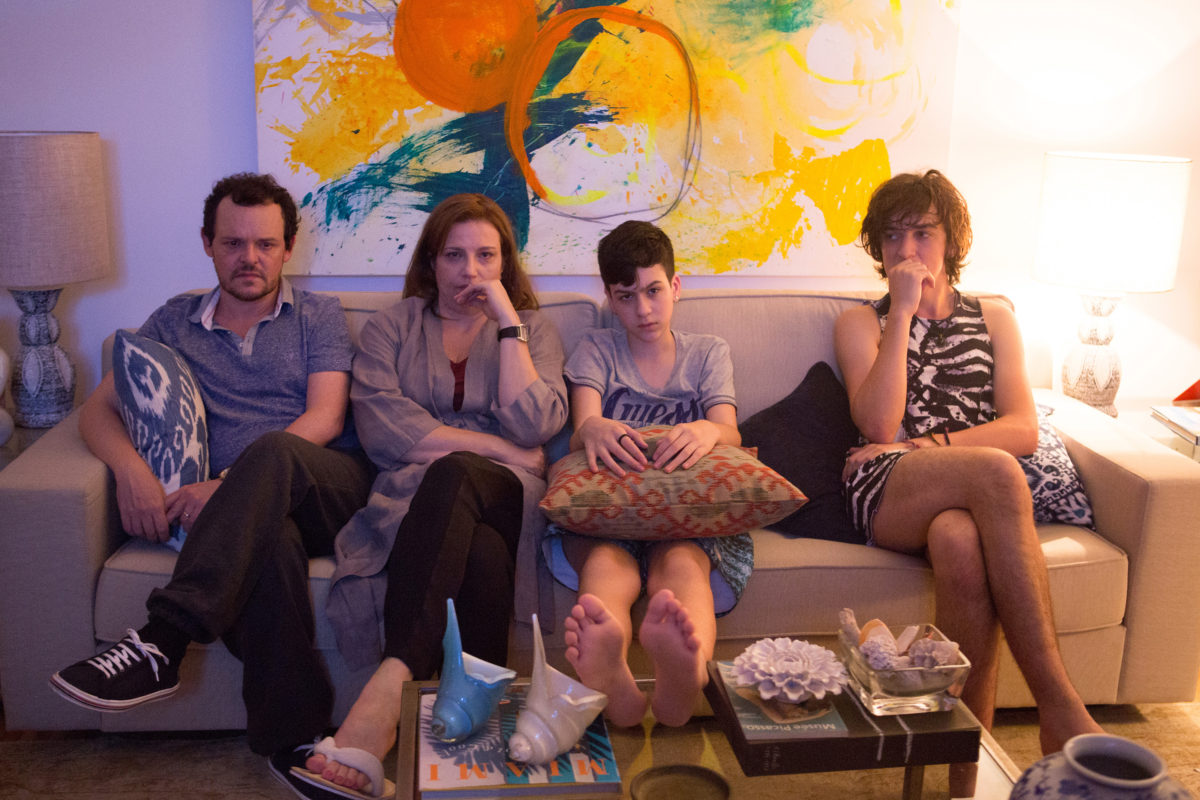
Anna Muylaert the Brazilian writer/director of last year’s rather sublime drama the multi-award winning The Second Mother, returns to the theme of family dynamics with her latest movie, as she explores the reality of parental/child relationships which cannot conform to everyone’s expectations and perceptions.
This is the story of Pierre (Namoi Nero) a free-spirited teenager who plays in a rock band, has a penchant for wearing g-strings under his jeans and seems quite comfortable having sex with either girls or boys. He experiments with his feminine side by occasionally cross-dressing and wearing lipstick in the privacy of his bathroom at home. He and his younger sister Jacqueline (Lais Dias). who he is very close too, are cared for by Aracy (Daniela Nefussi) their working class mother who has been single since their father died.
Their happy cosy life is shattered one day with a visit from the Police who reveal that Aracy had stolen Pierre when he was a baby in hospital, and for the past 17 years his biological parents have been searching from him. With Aracy now behind bars Pierre is reunited with Gloria (also played by Nefussi) and Matheus (Matheus Nachtergaele) an affluent traditional abd rather bourgeois couple and their younger son Joca (Daniel Botelho) who attempt to offer him everything he could possibly want, but he bitterly resents all their well-meaning attempts to make him feel part of their family.
Unsure even what to call him ….. he had been christened Felipe ….. his ‘parents’ desperately however what him to confirm to their own lifestyle and even take him shopping to buy him more conservative clothing. Their heavy-handed approach infuriates Pierre and completely backfires when he rejects all their selection and insists on buying a dress instead. His anger with them doesn’t just reside in the fact that he blames for the fact that his mother is in jail but now the police have established that his sister had also been abducted, and she too is forced against her will to go live with her biological parents who are naturally total strangers to her.
Unable to communicate Pierre and his ‘parents’, and in particular his father who has a short-fused temper, both let their anger simmer away quietly just below the surface until on one ill-fated attempt at a family outing it ends in a shouting match and fight. No longer able to contain himself anymore a frustrated Pierre screams at them, complaining that he was stolen twice. Once from the hospital when he was a baby, and now again from his ‘real’ mother and sister, and he blames Maurizio and Gloria totally for this.
Muylaert handles the story with a great deal of sensitivity, although her sympathy lies fairly and squarely with the two children who she considers the victims in this scenario. Deliberately leaving out some of the detail of the backstory was a shrewd move too, as it gave us plenty of scope to imagine the rest. The neat unexpected ending also shows that she has faith that if it can resolved then, it will actually down to them, and not any of the adults in the picture, whether they be parents or the authorities.
She took a big chance in casting a total newbie in the role of Pierre/Felipe which really paid off quite brilliantly, as he captured both the teenager’s genderqueerness, and his frustration with adults so perfectly. Kudos too for having both mothers played by a remarkably talented Nefussi who is relative unknown too.
Pierre’s queerness is an incidental part of his story but nevertheless it contributed to the fact that the movie picked a Best Audience Teddy Award (for LGBT movies) at the Berlinale when it premiered there early this year. Having said, it would be totally wrong to pinpoint this purely as a LGBT movie as that would be misleading as this is a story that will resound with mainstream audiences too, and so deserves to find them.

